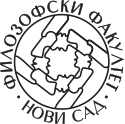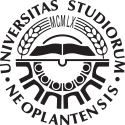15FLFL027 - Ontology 2
| Course specification | ||||
|---|---|---|---|---|
| Course title | Ontology 2 | |||
| Acronym | 15FLFL027 | |||
| Study programme | Philosophy | |||
| Module | ||||
| Type of study | first degree undergraduate academic studies | |||
| Lecturer (for classes) | ||||
| Lecturer/Associate (for practice) | ||||
| Lecturer/Associate (for OTC) | ||||
| ESPB | 5.0 | Status | ||
| Condition | none | Oblik uslovljenosti | ||
| The goal | Introduction to metaphysics as a central philosophical standpoint inside the historical development of philosophy. Connection of ontological concepts and problems with the foundations of human knowledge, practice and creativity. Acquisition of knowledge about central ontological conceptions. Insight into the problems of philosophical positioning of ontology as a central philosophical discipline. | |||
| The outcome | Acquisition of comprehensive knowledge about historical development of central philosophical concepts. Orientation with respect to the basic standpoints which have been brought into connection with the idea of first philosophy. Acquisition of prerequisites for particular application of central concepts of ontological tradition in the context of contemporary world. | |||
| Contents | ||||
| Contents of lectures | Kant's critical revision of ontology. Fichte's merging of ontology with practical philosophy. Schelling's conception of ontology and philosophy of nature. Hegel's grounding of ontology as science of logic. Post-Hegelian impugnment of ontology. Nietzsche's ontology. Phenomenological ontology. Fundamental ontology. Contemporary revision of ontology. Ethics as first philosophy. Possibility of contemporary transformation of ontology. | |||
| Contents of exercises | Work on the production of written paper. Practical application of philosophical insights from the field of fundamental ontological vocabulary in its debate with recent philosophical problems | |||
| Literature | ||||
| ||||
| Number of hours per week during the semester/trimester/year | ||||
| Lectures | Exercises | OTC | Study and Research | Other classes |
| 2 | 2 | |||
| Methods of teaching | Lecturing. Dialogue on given topic. Practical demonstration of textual analysis. Research work. | |||
| Knowledge score (maximum points 100) | ||||
| Pre obligations | Points | Final exam | Points | |
| Activites during lectures | 10 | Test paper | ||
| Practical lessons | 10 | Oral examination | 60 | |
| Projects | ||||
| Colloquia | ||||
| Seminars | 20 | |||

